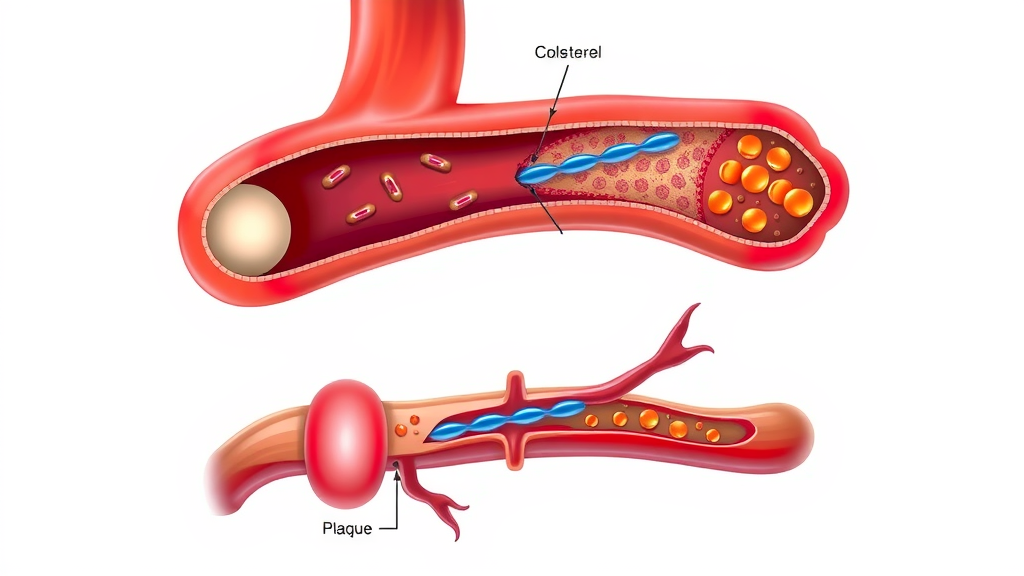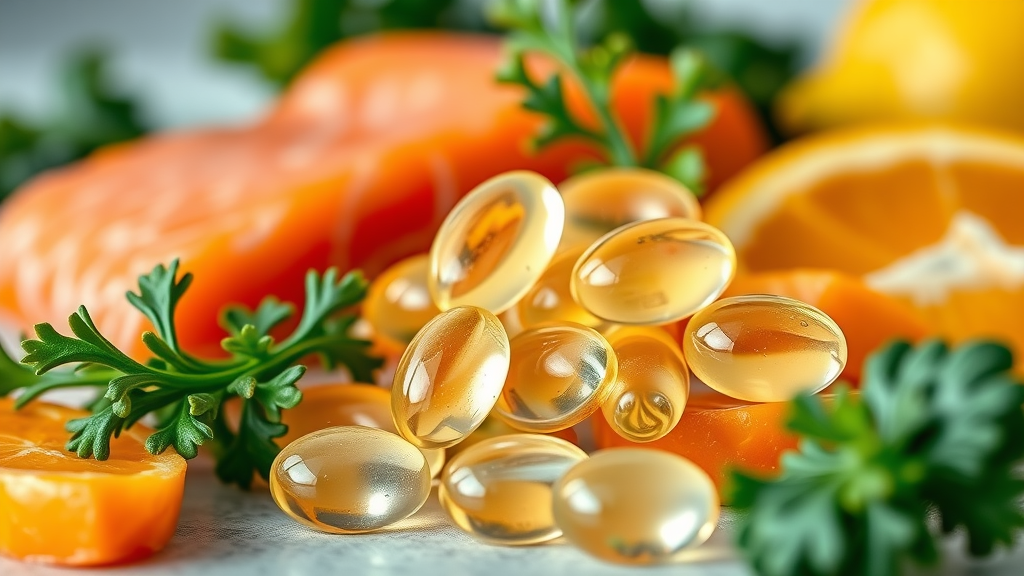Did you know: More than 94 million U.S. adults have high cholesterol, yet only a small fraction try science-backed natural supplements before turning to medication. If you’re one of them, you may be surprised by just how effective natural supplements for high cholesterol can be—and how simple changes could genuinely improve your heart health . In this comprehensive guide, you’ll uncover the real facts and research behind ingredients like red yeast rice, plant sterols, and omega-3 fatty acids, plus smart strategies to blend these remedies into your daily routine. Don’t let cholesterol control your future; instead, discover proven, natural ways to take charge of your health and reduce your risk of heart disease.

Unveiling the Truth: Surprising Facts About Natural Supplements for High Cholesterol
"Did you know? Over 94 million U.S. adults have high cholesterol, yet only a small fraction try proven natural supplements for high cholesterol before turning to medication."
-
What natural supplements for high cholesterol are best supported by research
-
How plant sterols, red yeast rice, and omega-3s lower cholesterol
-
Potential side effects and risks
-
How to choose and use these natural remedies responsibly
-
Answers to the most common high cholesterol supplement questions
Understanding High Cholesterol: What It Is and Why It Matters for Heart Health
The Basics of High Cholesterol and Its Effect on Heart Health
High cholesterol occurs when there is an excessive amount of cholesterol—a waxy, fat-like substance—in your blood. Not all cholesterol is bad; your body actually needs it to build healthy cells. However, too much low-density lipoprotein (LDL) cholesterol (often labeled bad cholesterol ) is what increases the risk of fatty deposits in your blood vessels, leading to blockages. Over time, this buildup (called plaque) can harden and narrow your arteries, making it harder for blood to flow freely throughout your body. If a plaque ruptures, it can cause a blood clot that blocks flow entirely, leading to a heart attack or stroke.
Keeping cholesterol in check is central to good heart health . The goal is to have lower LDL cholesterol and higher high-density lipoprotein (HDL) cholesterol, which helps remove bad cholesterol from your bloodstream. While many people rely on prescription medications, natural supplements for high cholesterol have emerged as a valuable tool for those seeking a holistic approach to maintaining healthy cholesterol levels —especially when combined with a balanced lifestyle.

How High Cholesterol Influences the Risk of Heart Disease
Persistent high cholesterol is closely linked to the development of heart disease . When LDL cholesterol accumulates in the arteries, it leads to atherosclerosis—or the thickening and hardening of artery walls. This restricts blood flow, increases blood pressure, and raises the risk of heart disease and related complications. In fact, studies show that people with high cholesterol are twice as likely to develop heart disease compared to those with optimal cholesterol levels.
Proactively managing your cholesterol level is one of the most effective ways to safeguard your cardiovascular health. This is where natural supplements for high cholesterol come into play—helping to regulate cholesterol production and absorption, reduce inflammation, and enhance artery function. They offer a secondary or complementary support, especially for individuals who cannot tolerate standard statin medications or want a more natural approach alongside medical treatment.
Exploring Natural Supplements for High Cholesterol: An Evidence-Based Overview
The world of natural supplements for high cholesterol is filled with bold claims. However, only a select few—including red yeast rice , plant sterols and stanols , and fish oil —have substantial scientific backing. These supplements work in different ways: some reduce cholesterol absorption in the gut, while others inhibit cholesterol synthesis in the liver or promote the removal of excess cholesterol from the blood. Below, you can compare popular options by reviewing their effectiveness, leading brands, and possible side effects.
|
Comparison of Leading Natural Supplements for High Cholesterol – Effectiveness, Popular Brands, and Possible Side Effects |
|
|
|
|
|
Supplement |
How It Works |
Popular Brands |
Effectiveness |
Possible Side Effects |
|---|---|---|---|---|
|
Red Yeast Rice |
Contains monacolin K, a naturally occurring statin; inhibits cholesterol production in the liver |
Nature’s Plus, NOW, Jarrow Formulas |
Significantly lowers LDL cholesterol (10-20%) |
Liver toxicity, muscle pain, digestive issues, possible contamination |
|
Plant Sterols & Stanols |
Block cholesterol absorption in the intestine; lower LDL |
Nature Made, Benecol (foods), Andrew Lessman |
Lowers LDL cholesterol by 5-15% |
GI upset, interference with absorption of fat-soluble vitamins (rare) |
|
Fish Oil (Omega-3) |
Reduces triglyceride levels, supports heart health, modest effect on LDL |
Nordic Naturals, Carlson, Nature Made |
Reduces triglycerides (20-50%), modest LDL reduction |
Fishy aftertaste, GI discomfort, bleeding risk at high doses |

Red Yeast Rice and Yeast Rice: Potent Natural Supplements for High Cholesterol
How Red Yeast Rice Works to Lower Cholesterol Levels
Red yeast rice is produced by fermenting white rice with a specific type of yeast called Monascus purpureus . During fermentation, this yeast generates a compound called monacolin K—chemically identical to the prescription statin drug lovastatin—which is the active ingredient responsible for lowering cholesterol. By inhibiting the enzyme HMG-CoA reductase in the liver, red yeast rice decreases cholesterol production, directly impacting LDL (“bad”) cholesterol levels and, to a lesser degree, total cholesterol.
The result is a supplement that mimics some prescription treatments but is available over the counter as a dietary supplement. Because of these unique properties, red yeast rice has become one of the most popular and effective natural supplements for high cholesterol —particularly for those who prefer an alternative to synthetic statins or have difficulty tolerating their side effects.
Evidence Behind Yeast Rice, Red Yeast, and Red Yeast Rice for Heart Health
Numerous studies show that red yeast rice can lower LDL cholesterol by as much as 10–20%, making it highly effective among natural remedies. Chinese clinical trials and U.S. studies alike report substantial decreases in total cholesterol, LDL cholesterol, and even triglyceride levels in participants using standardized red yeast rice supplements.
The value of yeast rice extends to overall heart health , as lowering LDL levels is directly tied to reducing the risk of heart disease . As always, individual responses can vary, so it’s wise to monitor cholesterol levels regularly and speak with your healthcare provider before starting any supplement—especially if you’re taking prescription medications or have an existing health condition.
Potential Side Effects and Risks of Red Yeast Rice Supplements
Although red yeast rice is natural, its side effect profile can resemble that of statins. The most commonly reported side effects include muscle pain and weakness, changes in liver enzyme levels, and digestive complaints such as gas or bloating. A pressing concern is the quality control of supplements, since some products may be contaminated with citrinin (a toxin) or may not contain reliable levels of the active ingredient monacolin K.
Furthermore, anyone with liver disease, kidney disease, or a history of statin intolerance should be cautious about using red yeast rice without close medical supervision. Always choose products that are third-party tested for purity and potency to minimize risk and ensure you reap the benefits safely.
Plant Sterols, Stanols, and Sterol Levels: How They Lower Cholesterol Naturally
Plant Sterol and Plant Sterols Explained: Mechanism of Action
Plant sterols and stanols are cholesterol-like substances found naturally in fruits, vegetables, nuts, and seeds. These compounds compete with dietary cholesterol for absorption in the digestive tract. When you consume plant sterols and stanols , they prevent some of the cholesterol from entering your bloodstream; instead, it’s excreted as waste. The science is clear: higher sterol levels from dietary sources or fortified foods/supplements result in a measurable drop in both total cholesterol and LDL cholesterol.
One of the most significant benefits of plant sterols and stanols is their minimal impact on HDL (“good”) cholesterol and triglyceride levels, making them a targeted approach to lower cholesterol without broadly affecting other aspects of your lipid profile.
Scientific Research on Sterols and Stanols for Lowering Cholesterol Levels
Multiple clinical trials support the ability of plant sterol and stanol supplementation to lower LDL cholesterol by 5–15%. Studies show that consuming just two grams per day (either through fortified foods or supplements) can bring about substantial changes in cholesterol numbers. These improvements are even more pronounced when sterols and stanols are combined with a healthy diet and other natural supplements for high cholesterol.
Notably, plant sterol and stanol supplements are generally safe and well tolerated. Most research supports their use as an adjunct to, not a replacement for, prescribed medications or larger lifestyle changes if your cholesterol levels are especially high or your risk of heart disease is substantial.

Addressing Side Effects and Safety of Plant Sterol Supplements
Side effects from plant sterol supplements are rare and typically mild. These may include digestive discomfort, such as gas or bloating, especially when starting supplementation. In very high doses, they might interfere with the absorption of fat-soluble vitamins, like A, D, E, and K—which can be managed by adjusting timing or considering a multivitamin with these nutrients.
As with all dietary supplements , the quality of the product is paramount. Choose brands that provide third-party certifications and clear dosing guidelines. If you’re taking other medicines for high cholesterol or other health conditions , speak with your healthcare provider before adding plant sterols to your regimen.
Fish Oil and Omega-3 Fatty Acids: Healthy Fats for Lower Cholesterol and Heart Health
The Role of Fatty Acids and Fish Oil in Heart Health and Lower Cholesterol
Fish oil supplements are rich in omega-3 fatty acids (EPA and DHA), which have long been heralded for their heart-protective effects. Rather than directly lowering LDL cholesterol, omega-3s are most effective at reducing triglyceride levels—a crucial factor for overall heart health . They also help counteract inflammation, improve arterial flexibility, and decrease the risk of dangerous blood clots. Regular consumption of fatty fish (like salmon or sardines) or fish oil supplements is associated with a lower risk of heart disease , fewer arrhythmias, and less arterial plaque buildup.
If you’re considering natural supplements for high cholesterol , omega-3 fatty acids work best as part of a comprehensive heart health strategy, supporting lower triglycerides and promoting optimal vascular function.
Benefits, Best Practices, and Side Effects of Omega-3 Supplements
The main benefit of fish oil supplements is a marked reduction in triglyceride levels—sometimes by as much as 20–50%. While the effect on LDL cholesterol is modest, omega-3s substantially reduce inflammation and can help lower blood pressure. For most people, a dosage of 1,000–2,000 mg of combined EPA and DHA per day strikes the right balance between efficacy and safety.
Side effects from omega-3 supplements are generally minor, such as a fishy aftertaste, mild stomach discomfort, or loose stools. Consuming fish oil with meals reduces these effects. However, those on blood thinners or with bleeding disorders should exercise caution, as fish oil can slightly increase bleeding risk at high doses.

Managing the Risk of Heart Disease with Natural Supplements for High Cholesterol
How Natural Supplements Address Risk of Heart and Risk of Heart Disease
Each major supplement targets heart health in unique ways. Red yeast rice mimics statin effects, plant sterols and stanols block cholesterol absorption, and fish oil reduces triglyceride levels and inflammation. Regularly taking natural supplements for high cholesterol may help reduce the risk of heart disease —especially when elevated cholesterol is combined with other risk factors like high blood pressure or diabetes.
Importantly, supplementation is not a magic bullet. Instead, it works best as a complementary approach, strengthening the benefits of prescription medications, dietary adjustments, and increased physical activity. The best heart health outcomes arise from the thoughtful integration of supplements, medicines, and lifestyle choices, all personalized with guidance from a medical professional.
Combining Lifestyle Changes with the Best Supplements for Cholesterol Reduction
Studies consistently show the most powerful cholesterol-lowering effects occur when you combine dietary supplements with healthy habits: a balanced, low-saturated-fat diet, regular physical activity, and maintaining a healthy weight. For those eager to avoid or reduce medicine, this holistic approach offers a safe, proven path to better cardiovascular outcomes.
Integrating supplement use into a broader wellness plan multiplies benefits and helps you lower cholesterol while addressing other health risk factors at the same time.
Safety Considerations, Side Effects, and Interactions: What to Know Before Trying Natural Supplements for High Cholesterol
Known Side Effects of Red Yeast Rice, Plant Sterols, and Fish Oil
Red yeast rice supplements may lead to muscle pain, digestive upset, changes in liver enzymes, and—rarely—serious organ complications if quality is poor or dosing is excessive.
Plant sterols and stanols are typically safe but can, in higher doses, reduce the absorption of fat-soluble vitamins or cause mild stomach upset.
Fish oil and omega-3 supplements’ side effects are usually mild (belching, loose stools), but the bleeding risk may increase for those taking anticoagulants or preparing for surgery.
Drug Interactions and When to Avoid Certain Supplements
Supplements may interact with prescription medicines (especially statins, blood thinners, and some heart or liver drugs) and other dietary supplements. For example, red yeast rice should generally not be combined with prescription statins, as side effect risks increase. People with existing liver, kidney, or muscle conditions—or who are pregnant or breastfeeding—should avoid these supplements unless specifically recommended by their healthcare provider.
Always check with your pharmacist or doctor if you take medications for health conditions or are uncertain about supplement interactions or contraindications.
Who Should Try Natural Supplements for High Cholesterol? Key Considerations and Health Conditions
When to Consult Your Healthcare Professional about High Cholesterol Remedies
Not everyone is a candidate for natural supplements for high cholesterol ; your individual needs will depend on your cardiovascular risk, underlying health, and preferences. Those with a mild elevation in cholesterol, a low overall risk of heart disease , or intolerance to medications are best suited for a supplement-first approach. In contrast, people with very high cholesterol levels, a history of cardiovascular problems, or complicated medical backgrounds should pursue a coordinated treatment plan with their medical provider.
As a rule, start the conversation with your doctor when considering natural remedies—especially if you’re already on prescription medications or have other health conditions that could affect your safety.
How to Choose the Right Natural Supplements for Your Cholesterol Level
Tips for Assessing Quality, Purity, and Dosage
The supplement industry is not as tightly regulated as pharmaceuticals, so it’s vital to assess product quality before buying. Look for third-party tested supplements—these are reviewed by independent organizations to confirm potency and purity. Choose recognizable, reputable brands and review scientific research to verify their claims. The ideal product provides clinical evidence of effectiveness, transparent dosing information, and clear instructions for safe use.
-
Verify third-party testing
-
Check for reputable brands
-
Review clinical evidence
-
Seek medical guidance
Top Lifestyle Strategies and Diet Tips to Lower Cholesterol Alongside Natural Supplements
Dietary Approaches to Complement Natural Supplements for High Cholesterol
A healthy diet is the cornerstone of cholesterol management. Emphasize whole grains, fiber-rich foods, fresh fruits and vegetables, and healthy fats such as olive oil or avocados. Cut down on saturated fat (found in fatty meats, full-fat dairy, and many processed foods) and trans fats. Incorporating foods rich in plant sterols and stanols —such as nuts, seeds, and fortified juices—can amplify the effects of your supplements for a sustainable drop in LDL cholesterol.

Physical Activity and Its Heart Health Benefits
Staying active is just as crucial as what you eat. Regular aerobic exercise (such as brisk walking, cycling, or swimming) improves your cholesterol profile by raising HDL, lowering triglycerides, and reducing the risk of heart disease. Aim for at least 150 minutes of moderate-intensity exercise weekly to see noticeable improvements in cholesterol levels and heart health.
When supplements, healthy food choices, and regular movement work together, you give your body every chance to thrive—making natural supplements for high cholesterol part of a truly heart-healthy lifestyle.
People Also Ask: What is the best natural supplement for high cholesterol?
Answer: The most researched and effective natural supplements for high cholesterol include red yeast rice, plant sterols and stanols, and fish oil. Effectiveness may vary by individual, and combining supplements with lifestyle changes yields the best results.
People Also Ask: What's the best natural treatment for high cholesterol?
Answer: The best natural treatment is a combination of proven natural supplements like plant sterols and red yeast rice, heart-healthy diet, regular exercise, and maintaining a healthy weight. Always consult with a healthcare provider for individualized advice.
Additional Frequently Asked Questions on Natural Supplements for High Cholesterol
-
Are natural supplements for high cholesterol safe for seniors? – Generally, yes, but seniors should always consult with their medical provider before starting supplements, due to unique health needs and potential interactions.
-
How soon do supplements lower cholesterol levels? – It may take 6 to 12 weeks of daily use to see measurable changes in cholesterol levels; effects vary between individuals.
-
Can I take supplements with statin medications? – Some supplements may interact with statins or duplicate their effects. Always seek medical advice before combining them.
-
What foods are rich in plant sterols and fatty acids? – Foods include nuts, seeds, avocados, vegetable oils, fortified orange juice, and fatty fish like salmon or sardines.
Key Takeaways for Using Natural Supplements to Lower Cholesterol Safely and Effectively
-
Consult your doctor before beginning supplements for high cholesterol
-
Opt for evidence-based natural remedies like red yeast rice, fish oil, and plant sterols
-
Monitor cholesterol levels and possible side effects
-
Combine supplements with a healthy lifestyle for best heart health outcomes
Ready to Take Control of Your Cholesterol? Discover More on Senior Health and Wellness
For more great information on senior health and wellness, visit https://ElderEarth.us today!

To further enhance your understanding of natural supplements for high cholesterol, consider exploring the following authoritative resources:
-
The Mayo Clinic’s article, “ Cholesterol-lowering supplements may be helpful ,” provides an in-depth analysis of various supplements, including their potential benefits and side effects.
-
The National Center for Complementary and Integrative Health offers a comprehensive guide titled “ 8 Tips: High Cholesterol and Dietary Supplements ,” which outlines evidence-based recommendations and safety considerations for using dietary supplements to manage cholesterol levels.
These resources offer valuable insights into the efficacy and safety of natural supplements for high cholesterol, helping you make informed decisions about your heart health.
 Add Element
Add Element  Add Row
Add Row 




Write A Comment